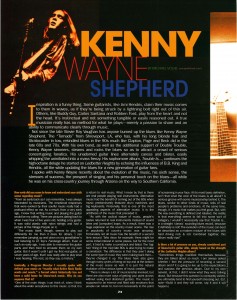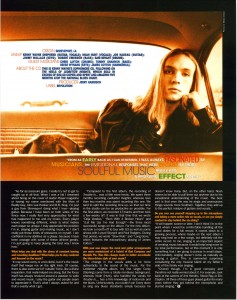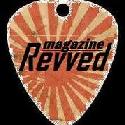(click on picture to open file)
By: Michael D. Vogel
© August 21, 1997. Michael D. Vogel. All Rights Reserved.
Published in:
The Album Network magazine – September 5, 1997
Free Gotham – November 10, 2010
Inspiration is a funny thing. Some guitarists, like Jimi Hendrix, claim their music comes to them in waves, as if you’re being struck by a lightning bolt right out of thin air. Others, like Buddy Guy, Carlos Santana and Robben Ford, play from the heart and not the head. It’s instinctual and not something that’s tangible or can be reasoned out. A true musician really has no method for what he plays, just a passion to share and an ability to communicate clearly through music.
Not since the late Stevie Ray Vaughan has anyone burned up the blues like Kenny Wayne Shepherd. The “Tornado” from Shreveport, LA, who has, with his long blonde hair and Stratocaster in tow, rekindled blues in the 90s much like Clapton, Page and Beck did in the late 60s and 70s. With his own band, as well as the additional support of Double Trouble, Kenny Wayne simmers, steams and rocks the blues so as to attract a crowd of serious concert-going fanatics. His unadorned guitar lines alternately caress and blister, easily whipping the unassuming into a mass frenzy. His sophomore album, Trouble Is…, continues the high-octane deluge he started on Ledbetter Heights by echoing the influences of B.B. King and Jimi Hendrix, all the while updating the blues for a new generation of guitar fans. I spoke with Kenny Wayne recently about the evolution of the music, his sixth sense, the stresses of success, the prospect of singing and his personal touch on the blues; all the while on his cross-country journey through Arizona on the way to Southern California.
How early did you come to know and understand your sixth sense regarding music?
Kenny Wayne Shepherd: “From as early back as I can remember, I was always fascinated by musicians. The emotional responses that were evoked by their soulful music really had a profound effect on me. As a result, from a very early age, I knew that writing music and playing the guitar would be my calling. There are pictures dating back to when I was four or five years old, holding a plastic toy guitar. It was solid plastic with nylon strings and had a picture of the Village People on it.
“The music itself, though, seems to play out differently for me than it does for others. I can remember jumping up and down on my grandfather’s bed listening to ZZ Top’s Fandango album. Even at such an early age, I was able to memorize the guitar parts and then tried to emulate them on my own guitar. But it wasn’t until I got my first real guitar, at seven years of age, that I was really able to play what I was hearing. The rest, as they say, is history.”
Rock music is based on the blues, yet ironically, a Program Director I recently spoke with defined your music as “exactly what Active Rock radio wants and needs,” a format which historically has not been a solid home for blues/rock music. Why do you suppose that is?
KWS: “One of the main things I can think of, when I think about the wider acceptance to this music is that it is a return to real music. What I mean by that is there are real people playing real instruments. Alternative music had the benefit of coming out of the 80s when music predominantly featured drum machines and big keyboards. Personally, that is one of the most appealing aspects of alternative music: it is the antithesis of the music that preceded it.
“As with the cyclical nature of music, people’s tastes returned to real instruments instead of sound bites and [computer] loops. As a result there was a huge explosion on the country music scene. The rise in popularity of country music was amazing. Fortunately not all music has the benefit of a second time around. Take disco for example, there might be some initial interest in some places but for the most part, it tried to make a comeback and failed. The ‘big-hair’ thing of the mid/late 80s is also trying to make a comeback. The difference is that they aren’t doing the same type of music they were making back then–they’ve changed it up. The blues have also gone through many cycles of being on top and at the bottom of the music scene as well. It is just the natural evolution of the various types of music created.
“There is always a lot of musicianship involved, but there are also more ways of getting your point across without using loud distorted guitars. The music is supposed to be intense and filled with emotions that people can relate to, but not necessarily to the point of screaming in your face. At its most basic definition, isn’t that what the core of the blues is all about? A serious groove with some musicianship behind it. The blues, similar to other kinds of music, tells of real people’s problems and emotions. At the same time, though, it’s music that makes you feel good. But, with the way everything is defined and labeled, the reality is that everything seems to fall into some sort of category. I wouldn’t necessarily say that Trouble Is…, is a straight ‘classic’ sounding blues record, because it definitely is not! The evolution of the music can best be described as a modern mixture of the blues with hard driving rock & roll. Combined together, this album really rips!”
 Is there a lot of pressure on you, already considered part of blues/rock’s guitar elite–beginning as such a soulful teenager–simply based on the strength of the Ledbetter Heights album?
Is there a lot of pressure on you, already considered part of blues/rock’s guitar elite–beginning as such a soulful teenager–simply based on the strength of the Ledbetter Heights album?
“Sometimes things manifest themselves because they are talked about so much. I am always asked whether I feel the pressure of recording a second album and if it is going to live up to the expectations and surpass the previous album. Due to my own naiveté, at first, I didn’t know what they were talking about. But because this question is constantly asked, you ultimately tend to find yourself stressing out. [Build it and they will come/say it and it will happen.]
“As far as pressure goes, I really try not to get to caught up in all that. When I was a kid I dreamed about being on the cover of Guitar Player magazine or having my name mentioned with the likes of Buddy Guy, John Lee Hooker and B.B. King. I’m just a guy from Shreveport doing what I love–playing guitar. Because I have been on both sides of the fence now, I really feel very appreciative for what has happened to my music and me. Every player knows something different, which is what makes each player so unique. I truly appreciate the position I’m in, playing guitar and making music, so I don’t really put those kinds of pressures on myself. I am confident in my abilities as a player, because I have been onstage with some of these all-time greats. I’m just going to keep playing the best way I know how.”
What helps you deal with the stress of constant touring and recording deadlines? What helps you to stay centered and focused on the music?
“It may sound corny or a bit cliché, but it’s the music itself that keeps me on the right track. Of course, there is also some sort of ‘outside’ force, like a divine inspiration, that really helped me along. But the focus itself has always revolved around a passion to write and record music. I play the guitar and people seem to appreciate it. That’s what I always asked for and that’s exactly what I got.
“Compared to the first album, the recording of Trouble Is… was a little more hectic. We spent three months recording Ledbetter Heights, whereas less than two months was spent recording this one. We tend to split the recording time up, so that our time in the studio can be as productive as possible. For the first album, we recorded 13 tracks and then took a few weeks off. It was in that time that we wrote ‘Deja Voodoo,’ “Born With A Broken Heart” and “(Let Me Up) I’ve Had Enough”–the three most successful songs on the album. For the new album, we took a month off to tour with G3 as well as some shows with Lynyrd Skynyrd and Paul Rodgers. During that period, we wrote “Slow Ride” and “Long Gone,” which features the extraordinary playing of James Cotton.”
With your new singer, the vocal and guitar arrangements are more reminiscent of a hybrid of Bad Company and Humble Pie. Was this change made to better accentuate the blues-driven style of your music?
“The change in the vocals adds a lot more authenticity to the sound of the music. For the Ledbetter Heights album, my first singer Corey [Sterling] came from a totally non-blues background, whereas Noah [Hunt], who handled the vocals for Trouble Is…, has a firm knowledge of roots-rock and the blues. Unfortunately, you couldn’t pin Corey down to sing any blues standards simply because he doesn’t know any. But, on the other hand, Noah seems to be able to pull them out anytime due to his exceptional understanding of the music. The best part is that even the way he sings and pronounces things sounds more Southern. Together, they add up to the perfect mixture of guitars and vocals.”
Do you ever see yourself stepping up to the microphone and taking a more active role on vocals, similar to Jonny Lang and Ian Moore, or are you simply content to stay behind the six-string?
“It will happen sooner or later. I don’t think I’m to the point where I would be comfortable handling all the vocal duties for a full record. It comes down to a growing process, where maybe on the next album I may sing lead on a few songs, but definitely not the entire record. To me, singing is an important aspect of creating music because it would help bring more to my total performance, but at this moment it is only something that I am going to pursue in small steps. Unfortunately, singing doesn’t come as naturally as playing a guitar. This is somewhat surprising considering the only musical talent on my father’s side of the family was singing.
“Overall though, I’m in good company and therefore not really worried about it. For example, look back at the careers of Jimi Hendrix, Stevie Ray, or Eric Clapton. All three of these guys played guitar for many years before they got behind the microphone and started singing.” ^m^
Photograph Credit: Marina Chavez
Origin: Website:
Shreveport, LA www.kennywayneshepherd.net
Line-Up:
Kenny Wayne Shepherd – Guitars & Vocals Jimmy Wallace – Keys
Noah Hunt – Vocals Robert Emerson – Bass
Joe Nadeau – Guitar Sam Bryant – Drums
Guest Musicians:
Chris Layton – Drums Reese Wynans – keys
Tommy Shannon – Bass James Cotton – Harmonica
About This CD:
This is Kenny Wayne’s sophomore CD, following up on the heels of Ledbetter Heights which sold in excess of 500,000 copies and spent an amazing five months atop the national blues chart.
Discography:
Trouble Is… (Revolution, 1997)
Ledbetter Heights (Revolution, 1995)
Produced By:
Jerry Harrison
Label:
Revolution
© August 21, 1997. Michael D. Vogel. All Rights Reserved. This originally appeared on the Vogelism blog at https://www.vogelism.com, authored by Michael D. Vogel. This article may be shared or reprinted as long as this entire copyright message, including the source location of this article, accompanies it.














 Welcome to Michael D. Vogel’s online portfolio. I am a Los Angeles-based music journalist/content creator, and self-professed music-fanatic/radio-aholic. With more than 20 years of experience in multiple facets of the music industry including; music programming/air talent for terrestrial and internet radio as well as record label artist promotion, I have a finger on the pulse of what's new and under the radar in the emerging music scene. Areas of specific expertise include, but not limited to: rock (heritage, mainstream, heavy metal/hard rock and alternative), pop and adult contemporary, as well as radio, pop culture, sports, exercise and politics. I am applying my passion for music as a freelance writer for the Examiner as National Music Examiner (Examiner.com) in addition to West Coast Editor for FreeGotham (FreeGotham.com). Find me at michael@vogelism.com.
Welcome to Michael D. Vogel’s online portfolio. I am a Los Angeles-based music journalist/content creator, and self-professed music-fanatic/radio-aholic. With more than 20 years of experience in multiple facets of the music industry including; music programming/air talent for terrestrial and internet radio as well as record label artist promotion, I have a finger on the pulse of what's new and under the radar in the emerging music scene. Areas of specific expertise include, but not limited to: rock (heritage, mainstream, heavy metal/hard rock and alternative), pop and adult contemporary, as well as radio, pop culture, sports, exercise and politics. I am applying my passion for music as a freelance writer for the Examiner as National Music Examiner (Examiner.com) in addition to West Coast Editor for FreeGotham (FreeGotham.com). Find me at michael@vogelism.com. 